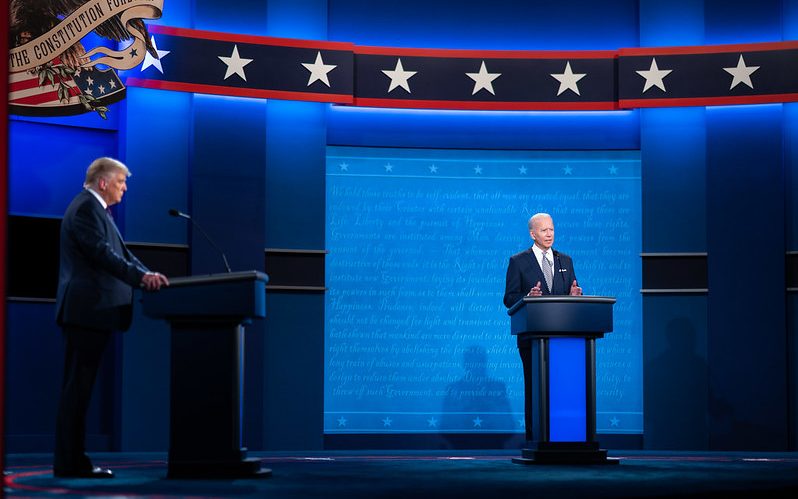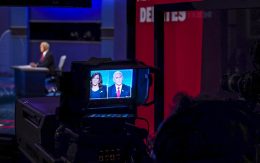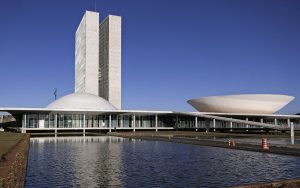The First US-Presidential Debate
The first of three presidential debates between President Donald Trump and former Vice-President Joe Biden, took place on Wednesday, 29th September 2020 in Cleveland 1. The discussion was moderated by Chris Wallace of Fox News.
Wallace set out the rules of the debate in the beginning, which both campaigns have agreed to: The debate would be divided into 6 segments of about 15 minutes each. In each segment, the candidates will be asked a question, for which they will have two minutes to answer. For the remaining time of the segments, there will be an open discussion. The topics have been chosen by the moderator himself and the questions have not been shared with any of the campaigns prior to the debate.
I. Supreme Court
Chris Wallace announced the topic of the Supreme Court as first topic of the debate. He introduced recent development, stating that, after Justice Ruth Bader Ginsburg’s recent death, as seat was up for nomination in the Supreme Court. Wallace then presented the previously shared views of Trump, who announced that he would nominate Amy Coney Barett since he has the constitutional right to do so, despite the upcoming presidential election 2, and Biden, who formerly stated that this is an effort by the Republicans and the president to “jam through” an appointment, which presents an abuse of power. He asked both candidates for their points of view, and to explain why they think they are right, and the other candidate is wrong with their viewpoint regarding this upcoming nomination. Wallace also asked both candidates where they think a justice ballot would take the court.
Trump was first to answer the question, stating that he won the elections have consequences. The Republicans won the Senate and the White House, and they have a phenomenal, respected nominee. He further claimed that the Democrats, if they were int eh position to choose a nominee, would not even think about waiting.
Biden then argued that, the American people have a say in the nomination, and they express that in their vote for the Senators and the president. As they are currently already in an election, they do not have the chance to express their choice as we do not know the outcome of the election yet. Therefore, they should wait and see what the outcome of the election is, before making a decision on the next Supreme Court Justice.
Biden further states that there are important issues up on the court right now, such as the Affordable Care Act (ACA) which Trump tries to get rid of, and which would strip 20 million Americans off of their access to affordable healthcare. If Coney Barett would be on the Supreme Court, she would help to get rid of ACA due to heir formerly expressed views on the Act. Therefore, “it is just not appropriate to do this before the election”, he says.
The candidates then turned to the open discussion, where they argued about healthcare, as well as the death of over 200.000 people in America due to COVID-19. Wallace then jumped in, and turning to Trump, stated that Trump for four years vouched to end Obamacare, however, he did not once come up with a plan on how to replace Obamacare. He then asked Trump what his healthcare plan is. As answer he gave an incomprehensible account of how he will cut drug prices by 80-90%, claiming that he will get, for example, insulin for so cheap – “it’s like water”. Unfortunately, he did not really provide an elaborate plan on how he will do that.
Wallace then asked Biden, whether it is true that he will end private healthcare and create a government takeover of healthcare, to which Biden explained that this is not true – he will not end private healthcare.
Chris Wallace lastly also asked Biden, in case the Senate confirms Justice Barett, if he would, once elected, pack the Court as previously suggested by some. Biden evaded the question, and simply reiterated that the American people should decide, and called on them go vote. Trump continuously interrupted Biden while he gave his sort-of-answer and Biden, seemingly losing his temper, reacted with “Would you shut up, man”. Wallace then ended this segment and they moved to the next topic, the COVID-19 pandemic.
II. The COVID-19 Pandemic
The moderator stated that experts say that, even if a vaccine is developed soon, it may take months or even years before everything can go back to normal. He then asked both candidates, why they think they are more trustworthy to deal with this public health crisis than the other candidate, starting with Biden.
Biden stated that, regarding the seriousness of the crisis and the number of deaths and new cases, Trump simply said “it is what it is”. He argued that the situation is only “as it is” because the President has no plan. He already knew in February how serious the situation was, and he did not inform the public. And he still has no plan, according to Biden.
Trump responds that, if everyone would have listened to Biden, the country would have been left open and millions would have died. He further argued that Biden said he was xenophobic for closing the country, and Biden would not have done it for another 10 months. Trump then praised his handling of the crisis and also argued that governors said he did a “phenomenal” job. The only reason he gets such bad press for the handling of the crisis is because of the fake news, who only compliment Biden and criticize Trump.
The president also attacked Biden for his mishandling of the swine flu (H1N1) back when Biden was vice-president – however, during that time 14.000 people died and not over 200.000, Biden countered.
There was then a longer back and forth between Biden and Trump about vaccines, and how fast they may actually be available, as well as a shutdown of the country, which Trump opposes. Wallace also Biden why he is so much more reluctant to reopening the country and schools than Trump, to which Biden answered that because Trump does not have a plan, and Businesses first need to have the money to be able to afford masks, and sanitation.
They also talked about the rallies that Trump held, which may increase the spread of COVID, while Biden only held small events. Trump argued that he holds these big rallies because people want to hear what he has to say and displayed no concern about the spread of the virus. Biden reiterated that Trump has completely disregarded social distancing rules, he is irresponsible and not worried about the American people. Trump then claimed that Biden would do the same, if he would be able to attain such large crowds, but he cannot.
Wallace then moved on to the third segment, the economy.
III. The Economy
Wallace stated that the economy is recovering faster in the second quarter than expected. However, while Trump states that it is a V-shaped recovery, Biden talks about a K-shaped recovery. He then asked both candidates what difference that makes to the Americans in terms of the economy, starting with Trump.
Trump praised the economic recovery in the last view months after the, as he called it, “China plague” hit the country. He also asserted that Biden wants to shut down the country again, and thereby destroy the country. He did not go much into details about the form of recovery, whether V-shaped or not.
Biden, when asked what the difference between a V-shaped or K-shaped recover is, answered that Billionaires such as Trump have done very well. But people in working-class towns have not. Then he jumped to the topic of Trumps taxes, as recently came out he only paid 750 US-Dollar in federal taxes. He also stated that Trump wants to open up the country right away and has no intention to do so safely. Biden argued “you can’t fix the economy until you fix the COVID crisis”.
Trump responded that people want their places open and they want the schools to open, to which Biden countered that people want them to be safe.
Chris Wallace then addressed the issue of Trump’s taxes, as a recent report indicated that Trump paid only 750 US-Dollars in federal taxes in 2016 and 2017, and asked Trump whether that was true.
Trump responded saying that he paid “millions of dollars in taxes” and “millions of dollars of income tax”.
Biden then announced that he will get rid of the Trump tax cuts and make sure that money is invested in those who actually do need help.
Wallace asked Biden about his economic plans going forward, specifically about his plans to increase taxes for those earning more than 400.000 US-Dollar per year and big corporations, as Trump says that this will hurt the economy even more.
Biden argued that according to studies, his economic plan would create 7 million more jobs than Trump’s plan in four years did, and it would create an additional $1 trillion in economic growth since it would be about buying American. He also stated that he will increase corporate taxes from 21% to 28%.
Wallace then turned to Trump and asked whether he wants to continue his free-market approach, and indicated that during Obama’s presidency, more jobs were created than during Trump’s administration
In his response, Trump asserted that the Obama administration had the slowest economy recovery since 1929. Biden countered that when Trump came in as president, the economy was booming, and he blew it. Trump opposed Biden’s argument, saying that he created 700.000 manufacturing jobs, while the Obama administration created none.
The argument then ended in a back and forth in a very childlike spirit between Biden and Trump about who brought back companies, who messed up the economy, and about Joe Biden’s son and businesses. The discussion got out of control, with Biden calling the President a Clown and Trump continuously interrupting and chattering while Biden tried to give a statement, so that even Chris Wallace had to raise his voice, before moving on to the next segment, the issue of race.
IV. Race
Wallace asked both opponents, starting with Biden, why the American should rather trust them instead of the other presidential candidate to deal with the race issues facing this country.
Biden criticized Trump’s dealing with the issue of race and his handling of the peaceful protest in front of the White House after the murder of George Floyd, when Trump instructed the military to use tear gas on the protestors. He further argues that Trump has done virtually nothing for African Americans in this country.
Trump argued that Biden called African Americans “super predators” and that he himself is doing better among African Americans in the polls than any Republican ever.
Wallace went on to ask Biden whether he thinks that there is a separate and unequal system of justice for Blacks in America. Biden agreed that there is systematic injustice in America: in education, in work, in law enforcement and in the way in which it is enforced.
The moderator then turned to Trump, asking him why he decided to end racial sensitivity training that addresses white privilege or critical race theory and whether he thinks that there is systemic racism in the country.
Trump responded that he ended it because “a lot of people were complaining that they were asked to do things that were absolutely insane” and further, that “they were teaching people to hate our country”.
Biden then countered that Trump is a racist, and that these sensitivity trainings are needed, and that people have to be made aware of what insults other people, what is demeaning to them.
Wallace then move to the issue of law and order, stating that there has been an increase in homicides this summer, which Trump blamed on democratic mayors and governors, although there has been a similar spike in republican cities. He therefore asked the president whether he thinks that this really is a party issue, to which Trump said it definitely is a party issue.
Biden was then asked what he meant by reimagining policing in his joint-recommendation from the Biden-Sanders Task Force, and whether he supports the Black Lives Matter call for community control of policing.
Joe Biden then argued that he is not totally opposed to defending the police, and what he wants is for the police to have the opportunity to deal with the problems they face. He also stated that they have to have community police, like they had before.
After another longer back and forth and a chain of interruptions, Wallace asked Trump if he would be ready to condemn white supremacists and militia groups, and to say that they need to stand down and not add to the violence cities. Trump stated that he would be prepared to do that, but everything he sees is from the elf-wing and not from the right-wing. In essence, he failed to condemn white supremacy, and all he said was “Proud Boys, stand back and stand by”, before went on to talk about the ”left-wing problem”. The moderator then ended this segment and moved to the next.
V. The Presidential Candidates’ Records
In this segment, Wallace started by asking both to explain why they think that voters should vote for them and not their opponent.
Trump went first in this segment and stated that there has never been a President who has done more in the same period of time. In essence, he praised the economy before COVID and his presidency.
Biden countered by saying that under Trump, America has become sicker, weaker, poorer, more dividing and violent. Back when he was vice-president, they inherited a recession, which they fixed, leaving a booming economy.
After another long round of crosstalk, Chris Wallace move to the topic of Climate Change.
He first asked Trump, who pulled out of the Paris Climate accord, what he believes about the science of climate change, and what he would do in the next four years to confront it.
Trump expressed that he wants “crystal clean water and air”, but that the Paris Climate Agreement was a “disaster”, and claimed that, looking at the numbers right now, America has the lowest carbon and are doing phenomenally. Regarding the forest fires, he stated that forest management is needed. When repeatedly asked by Wallace what Trump believes about the science of climate change, Trump dodged the question and beat about the bush.
Then, moving to Biden, the moderator asked him about his proposal to create green jobs, set new limits to fracking and ending the use of fossil fuels to generate electricity by 2035, as well as zero net emission of greenhouse gases by 2050. According to Trump, these would tank the economy and cost millions of jobs. Biden responded that this claim by Trump is absolutely wrong. Moreover, during the Obama administration, the Recovery Act I was able to bring down the costs of renewable energy to cheaper or as cheap as gas, oil and coal. Biden further argued that they will create thousands of thousands of jobs.
After another long round of discussion with multiple interruptions from Trump, Wallace moved to the sixth and last segment, election integrity.
VI. The Integrity of the Election
Wallace posed the question how confident Americans can be that this election is fair, and what the candidates are prepared to do over the next weeks. He asked Biden to start, who responded that people should get prepared to vote. He also stated that the FBI director says that there is no evidence that mail-in ballots may be manipulated. He then again called on the people to vote, as they have it in their hand to decide how this country is going to look like in the next four years. He further assured that if he wins, the result will be accepted as well as if he loses the election. Trump cannot say in power if he loses the election.
Trump during his two minutes, claimed that there was no transition when he won, and that the Democrats came after him, trying to overturn the result.
Regarding the issue of a fraudulent election because of mail-in ballots, Wallace asked him whether he would be counting on the Supreme Court to settle on a dispute. Trump assured that they would definitely ask them to look into the ballots.
Lastly, Wallace explained that there is a high chance that we will not know who the winner is on election night, and it could take days or even weeks until we have a final result. He therefore asked both candidates whether they will urge their supporters not to engage in civil unrest and to stay calm and whether they will pledge that they will not declare victory until the election has been independently certified.
Trump gave a very unclear answer, saying that he will tell his people to “go into the polls and watch very carefully”. He did not clearly state that he will urge his supporters to remain calm.
Biden answered that he will urge his supporters to stay calm until the vote is counted and not declare victory until it is independently certified.
Conclusion
Watching this debate was, in one word, exhausting.
In conclusion, one may say that this debate provided little answers to the questions asked and was almost embarrassing to watch. While Biden performed in a somewhat more presidential manner, Trump behaved like a little kid that did not get its way. He was outright disrespectful, by constantly interrupting Biden and even the Moderator. On the questions, Trump as well as Biden failed to give concrete answers to some, albeit Biden still tried to at least answer the majority of them in a comprehensive manner. Trump, however, used to beat about the bush, change topics completely, and accuse his competitor of incompetence, seemingly trying to distract from what was initially asked.
All in all, one can say that most of the things were that have been said were hard to understand: Either, because of incoherent crosstalk as Trump continuously interrupted Biden; or, because Trump gave such incomplete, incoherent answers, that it was partly hard to follow. Probably, the most entertaining thing in this whole debate was Biden’s “Would you shut up, man”, and Biden referring to Trump as “clown”.
Sources
New York Times (2020): Full Video: First 2020 Presidential Debate, https://www.nytimes.com/video/us/politics/100000007365697/presidential-debate-live.html, accessed 09.10.2020
Footnotes
- The whole video of the debate, that was used for this analysis, can be found here. [>]
- Note that the nomination for a Supreme Court Justice is a nomination for life, and that the nomination by a Republican or Democrat president seriously cement the Courts conservative or liberal direction of the Court. Generally, the nomination of the new Justice is up to the president. However, since there will be a presidential election in only a few weeks, which might lead to a transfer of power, some have argued that the seat on the Supreme Court should only be filled after the presidential elections. [>]








Be First to Comment